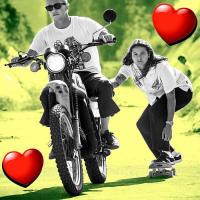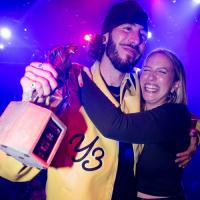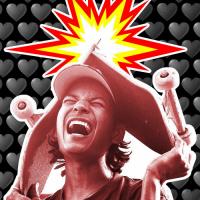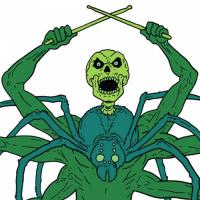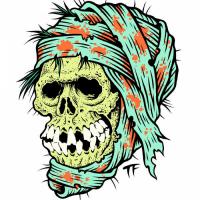Michael Christie: The Novelist Who Rips
5/18/2020
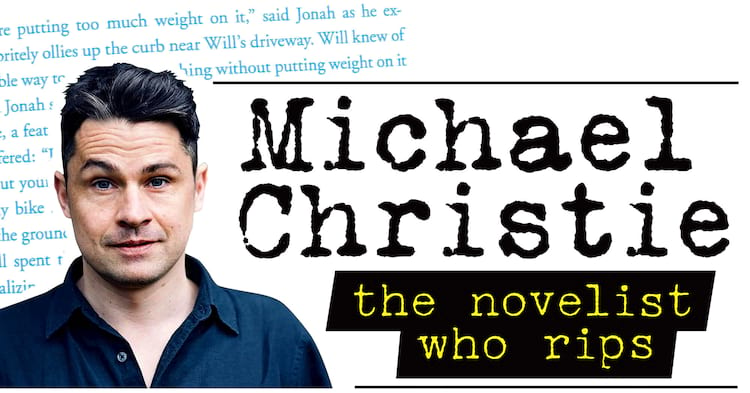
SKATERS HAVE a long track record of artistic impulses beyond the rolling plank. The wider worlds of painting, drawing, filmmaking, photography, music and clothing design all have influential contributors who hold deep ties to the stuntwood. One realm that is underrepresented by skaters is long-form writing, particularly novels. It's not clear why. The more you analyze creativity the more its essence flops around and dies during the dissection. Michael Christie is not the only skater/writer who has produced a novel, but his acclaim and rising status in the literary domain is impressive. We asked this board-flipping wordsmith about both of his crafts. —Adam Creagan
It might be tough to summarize something you’ve done most of your life, but give an overview of your skate history.
I grew up in a crusty, little Canadian city called Thunder Bay. It was a less than ideal place to begin skating because it snowed for about seven months of the year. For me, it all started when a kid on my street got a Steve Caballero board. As soon as I saw the dragon graphic and then watched him do a one-inch stationary ollie, I was obsessed. I quit all other sports and activities in order to skate. Eventually, I got sponsored by my local shop (shout-out to A. Aardvark). After high school I moved to Vancouver and took trips down to California. I was getting flowed Stereo boards for a while, but I didn’t love being in the US, and skating with people who were really, really good convinced me that I didn’t have the drive or talent required to be an actual pro skater. I came back to Canada to go to university. At school I was lonely but I loved being in libraries, and I kind of transferred my skate obsession over to studying and reading. After I graduated, I was working in a homeless shelter when I met Rick McCrank, Michelle Pezel, Keegan Sauder, and the Antisocial folks. I had a personal skate renaissance and got back into filming. I got flow sponsored by a few companies, made a bit of money, and took a bunch of incredible trips.
What are some skate highlights that stand out to you from your sponsored years?
When I was on the Canadian flow team for Chocolate, I got to go on the “Se Habla Canuck” tour with the Girl/Chocolate dudes. Skating with people like Gino Iannucci and Scott Johnston was a highlight. When I rode for Antisocial, we took a months-long filming trip to Barcelona, which was life-changing. I was once on a Satori wheels trip with Steve Olson, who was in full orange-suit crazy monk mode at the time, and he was insane and bizzare and kind of inspiring? I wish that I filmed more than I did. I was terrible at visual documentation then, and still am.
What is your relationship with skating now?
Even though I have two kids, I work full-time as a writer, and my body is pretty worn down, I still love to skate. I’m not really into Instagram clips, but I watch nearly every skate video on the Thrasher website. I love the alchemy of music and skating presented together, and the waves of young kids emerging with new, unbelievable tricks. I’m going to try to skate forever, if I can. Skating has given me so much. I tell people that it was like an on-ramp that led me into a whole bunch of creative interests like writing and film and photography. I don’t want to imagine the life I’d be living right now without it.
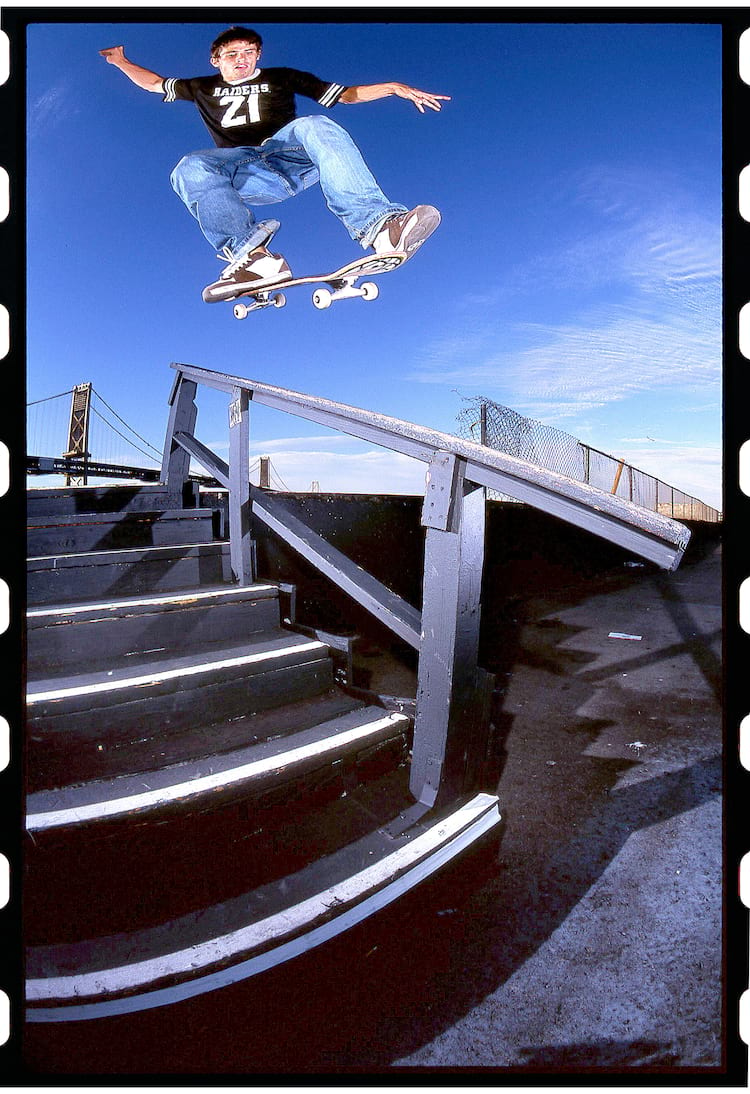 Kickflip 5-0 / Photo: Doubt Portrait photo by Bowers
Kickflip 5-0 / Photo: Doubt Portrait photo by Bowers
Who are your All-Time Top 5?
• Natas Kaupas – I had a copy of Streets on Fire and I watched Natas’ part until the tape broke and I had to take the VHS case apart with a little screwdriver to superglue the videotape back together. Natas was an extra-terrestrial.
I grew up in a crusty, little Canadian city called Thunder Bay. It was a less than ideal place to begin skating because it snowed for about seven months of the year. For me, it all started when a kid on my street got a Steve Caballero board. As soon as I saw the dragon graphic and then watched him do a one-inch stationary ollie, I was obsessed. I quit all other sports and activities in order to skate. Eventually, I got sponsored by my local shop (shout-out to A. Aardvark). After high school I moved to Vancouver and took trips down to California. I was getting flowed Stereo boards for a while, but I didn’t love being in the US, and skating with people who were really, really good convinced me that I didn’t have the drive or talent required to be an actual pro skater. I came back to Canada to go to university. At school I was lonely but I loved being in libraries, and I kind of transferred my skate obsession over to studying and reading. After I graduated, I was working in a homeless shelter when I met Rick McCrank, Michelle Pezel, Keegan Sauder, and the Antisocial folks. I had a personal skate renaissance and got back into filming. I got flow sponsored by a few companies, made a bit of money, and took a bunch of incredible trips.
What are some skate highlights that stand out to you from your sponsored years?
When I was on the Canadian flow team for Chocolate, I got to go on the “Se Habla Canuck” tour with the Girl/Chocolate dudes. Skating with people like Gino Iannucci and Scott Johnston was a highlight. When I rode for Antisocial, we took a months-long filming trip to Barcelona, which was life-changing. I was once on a Satori wheels trip with Steve Olson, who was in full orange-suit crazy monk mode at the time, and he was insane and bizzare and kind of inspiring? I wish that I filmed more than I did. I was terrible at visual documentation then, and still am.
What is your relationship with skating now?
Even though I have two kids, I work full-time as a writer, and my body is pretty worn down, I still love to skate. I’m not really into Instagram clips, but I watch nearly every skate video on the Thrasher website. I love the alchemy of music and skating presented together, and the waves of young kids emerging with new, unbelievable tricks. I’m going to try to skate forever, if I can. Skating has given me so much. I tell people that it was like an on-ramp that led me into a whole bunch of creative interests like writing and film and photography. I don’t want to imagine the life I’d be living right now without it.
 Kickflip 5-0 / Photo: Doubt Portrait photo by Bowers
Kickflip 5-0 / Photo: Doubt Portrait photo by BowersWho are your All-Time Top 5?
• Natas Kaupas – I had a copy of Streets on Fire and I watched Natas’ part until the tape broke and I had to take the VHS case apart with a little screwdriver to superglue the videotape back together. Natas was an extra-terrestrial.
• Mike Carroll – I could write a whole book about his backside Smith, and another one about that opening line from Modus Operandi. From as early as the H-Street videos, then the FTC videos, and on through Plan B and Girl, MC was always my favorite.
• Rick McCrank – He’s one of my best friends, but he’s also one of the most uncannily gifted skaters of all time. I’ve witnessed Rick do things on a skateboard that I’m still trying to comprehend, years later.
• Ishod Wair – The guy can do anything. Like anything. He’s the most skilled and consistent skateboarder of this recent era, in my humble opinion. Also, he’s hilarious.
• John Cardiel – Cardiel was mind-blowing to me. So much that I even named one of my fictional characters after him. The hectic desperation of his style, the shit he managed to roll away from, somehow, always made you feel like you hadn’t just witnessed a skateboard trick, but an actual miracle. Also, his indomitable response to his spinal cord injury are words to inspire us all: “Fuck that!” he told the doctor when he heard he wasn’t going to walk again. And he was right.
Was writing something you always did? How did that transition come into place where you truly pursued writing?
I always wrote in journals and read books while I was going to bed because it was the only way I could sleep. I grew up in a difficult family situation, so journal writing was important for me to stay sane. But it wasn’t until I went to university that I figured out that “literature” wasn’t just a boredom torture device that the education system inflicts upon students. And that good books are in fact the most human and interesting things around, even better than movies or photos, because they build a story with you, rather than for you. A book can teach you about what it actually feels like to be alive as another person, rather than just what it looks like. I transferred my skate obsession over fully to writing and reading. I wrote a short story and used it to apply to this Masters of Fine Arts program at the University of British Columbia, and I got in. The writing thing has worked out so far, which is nice. Since finishing my MFA I’ve written three books that have been published in six different languages. I’ve published essays in the New York Times and the Washington Post, and I’ve done some TV and film work as well. I was also the story editor for Rick McCrank’s Viceland TV show called Abandoned, which was really interesting and hilarious to work on.
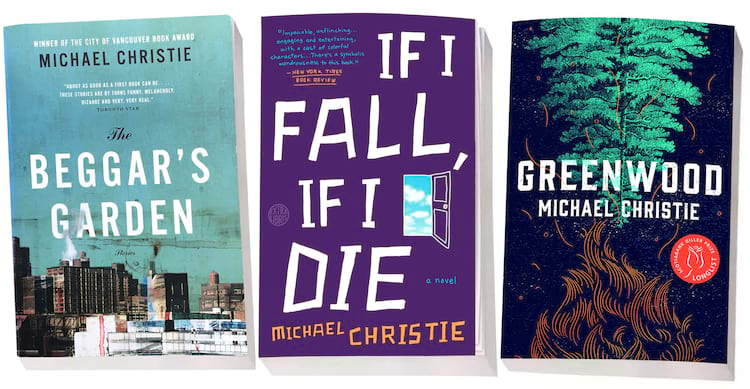
Writing a novel is an epic undertaking, often involving years of work. Describe some of the agonies and joys of the process.
My last novel, Greenwood, took me five years of nearly full-time work. It was just hours and hours of research and writing and re-writing. But I enjoyed every minute of it, because like skating, writing is a self-directed activity, and there is no boss or coach there telling you what to do. But it can be gruelling. It’s kind of like filming for a video part: you work to get these clips that you don’t even know will make it into the final edit. I think I cut 60,000 words from my novel If I Fall, If I Die during the editing process, which is like 240 printed pages of a book. It was painful. But it feels good to put only your best work forward. There’s no such thing as a perfect video part, and there’s no such thing as a perfect novel either, so you just have to give everything you have, and hope for the best. And despite all the agonies, what keeps me writing is the feeling of endless possibility, which is the same feeling that keeps me skateboarding. That there will always be something new to try or to learn.
What is your general writing routine?
Normally, my kids are in school, and so after they are out of the house, I go to this little 10x10 writing cabin that I have on my property and get to work. I don’t bring my cell phone with me, and there is no internet, so it forces me to focus, which is essential. I work from about 9am to 2pm-ish, when my mind is pretty much fried and I go do other stuff.
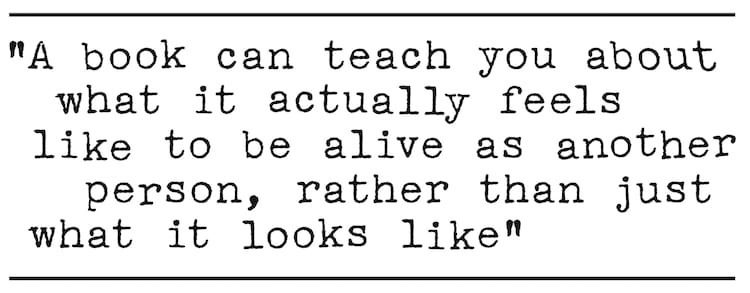
In If I Fall, If I Die, the protagonist, Will, lives with his mother who is essentially house-bound by her agoraphobia (fear of places/situations that may induce panic). By default, the son inherits his mother’s condition. The story is about Will breaking free of his fear and confronting a series of crimes and mysteries around town. Why did you choose this subject matter for your first novel?
My mom suffered from agoraphobia and panic/anxiety disorder for most of her life, and she couldn’t travel or even leave the house for large periods of time. If she did, she’d have these brutal panic attacks, which occasionally put her in psychiatric care for stretches of time. She was a really smart and creative person, though, and she and I had a wonderful and close relationship. I have definitely felt my share of anxiety/depression in my life, so there are many elements of this novel that were drawn from my own experience, but it’s also largely invented as well. I guess I chose this subject because it had the most emotional resonance for me. It was a story that I needed to tell. And my mom had died just prior to me writing it, so it felt like a great way to honor her, and to describe some of the struggles that she endured.
One of that story’s undercurrents is how the risk-taking inherent in skateboarding gives Will the freedom he craved. Can you expand on that?
I feel weird celebrating risk-taking, because it feeds into that old idea that skaters are essentially mindless “adrenaline junkies”, which is an idea that I hate. But I think there’s another kind of risk taking, one that’s calculated and driven by the desire to challenge yourself and to push beyond what you think you can do. An attempt to operate at the outer limits of your abilities. That is the kind of risk-taking that is good for you, I think, and that is the kind of risk-taking that Will engages in, with transformative results. Personally, skating gave me a kind of physical and mental freedom at a time when I needed it. It also gave me a kind of second family, at a time when my own family relationships were strained. So yeah, I think this particular kind of risk-taking is a wonderful thing.
Another theme in the book that will strike a chord with anyone who grew up skating, is the adventure involved with exploring rough and forgotten parts of town. Lurking and creeping is essential!
Oh man, the “adventures while lurking” aspect of skateboarding was important for me to get in there. I always appreciated the fascinating people you come into contact with while you’re out there in the streets. Some of the best people you’ve ever met, and some of the worst as well. So yeah, me and my friends always ended up gravitating to the rough parts of town, because that was where we probably wouldn’t be bothered as much. In my book, skaters are kind of like amateur urban archeologists and anthropologists, in a way, and I wanted to highlight that in the book.
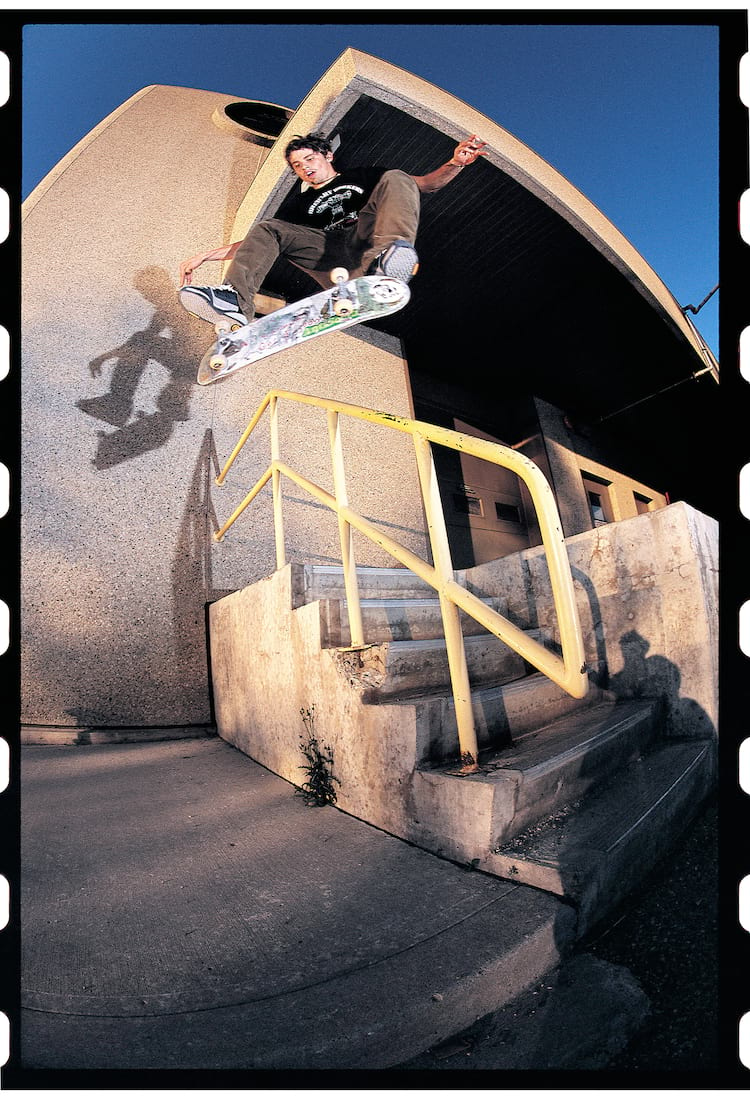 Switch frontside heelflip / Photo: Doubt
Switch frontside heelflip / Photo: Doubt
Your new book Greenwood is a multi-generational saga. How did the creation of this new novel compare to writing If I Fall, If I Die?
Greenwood took much longer than If I Fall, If I Die, that’s for sure. It’s less based on my life, and so it required a whole bunch more research to write, which was fun as well as demanding. But Greenwood has had a great reception so far and writing it allowed me to say some things about families, forests, and our destruction of the natural environment that I really needed to say. So I’m pretty happy with it.
The death of book reading has been predicted for decades but it never seems to arrive. Do you have hope for the future of books? Or do all these people staring at phones worry you?
“The death of book reading” is the worst kind of bullshit. Right now, young people are reading more books than my generation did. And I’ve talked to countless folks who are sick of the endless scrolling and sick of the fakeness of social media, and who’ve turned to books for truth and inspiration. But I understand that getting into reading can be difficult at first. Your attention span is a muscle that you need to strengthen, but it’s important to remember that anything worth doing is difficult at first. There’s nothing more satisfying than finishing a good book that took some perseverance and dedication to make it through. So to anyone who doesn’t read much, my advice is: give it a shot. Just sit with a book for a while and I bet you’ll feel way better and more focused afterwards. It doesn’t matter what you read. Fuck the idea of what’s “literary” or “good for you”. Read some Stephen King. Read some Sweet Valley High. Read some Denis Johnson. Just enjoy the experience. Because reading is one of the best things you can possibly do with your brain. It will strengthen your empathy for other people, and further develop your understanding of yourself. So yeah, I think that books have an incredible future ahead. We have stories like the Odyssey that are older than the countries we live in. These are stories that have already watched empires rise and fall, so I don’t think they’re in any danger now.

Skating produces a lot of extremely creative people, but very few novelists. There’s always been short-form bursts of good writing within skating, but rarely long-form—such as novels. Why do you think this is the case?
I’ve looked up to people like Spike Jonze and Ed Templeton who took their skate creativity and translated it successfully to other artforms. But I’m not sure why skater novelists are so rare. I have definitely read some inventive and amazing bursts of writing in skate mags over the years. Scott Bourne wrote some books, and there’s a writer named Bret Anthony Johnston who was a pretty good skater. But it seems like there should be many more, doesn’t it? Maybe there’s such a stigma with respect to writing being a “higher culture” type activity, that it scares skaters off? Or maybe we’re just at the very beginning of a massive surge of skateboarder writers.
What pro skaters, from any era, would you like to see write a novel?
1980s Neil Blender could have wrote an amazing book, I bet. A Mark Gonzales novel would be interesting as well; I imagine it reading more like Bob Dylan’s Tarantula—just kind of surreal and disorienting. I know that Mark Suciu is a big reader, and he clearly has the dedication and the smarts to pull a novel off. Walker Ryan is really into books, too. He reached out to me at one point, and he’s writing some really cool stuff as well. Oh, and I’d also love to see a book from someone like Leo Baker, who I bet has interesting stuff to say about their life experience. But really, I think that any pro skater who wanted to write a novel probably could do it. There’s nothing that requires so much effort and dedication and discipline for so little material reward as skating. Compared to skateboarding, writing is a walk in the park.
What are you up to now? What’s next?
About I week ago, I made a deal with a Hollywood studio to turn Greenwood into a limited TV series, so I’ve been busy working on that. And I’m also chipping away at an idea for a new novel. Writing during this pandemic has been challenging. It’s hard to imagine another world when the one you’re living in has become so crazy and unimaginably different.
What advice would you give an aspiring writer?
You can do it! Just find those particular books that you love, then read them and think about how they are made. If you want to write a memoir, read a bunch of good memoirs. If you want write a novel, find the style of novel that you love most and read tons of them. If you want to write music reviews, read a bunch of the best music reviews. Then think about how those pieces of writing are structured and try to do something similar yourself. Don’t worry about being influenced too much. Writing is an art, but it’s also a craft, and you need to learn the basics first. Also, share your writing with people. Have them tell you what they thought while reading it. Don’t take their criticism personally, but take it seriously. What people say about their reading experience is the key to how you can make it more powerful and immersive. Just write all the time. Describe the things that only you can notice. Tell a story you need to tell. I seriously believe that if you’re a skateboarder, you can do anything you put your mind to.

Writing a novel is an epic undertaking, often involving years of work. Describe some of the agonies and joys of the process.
My last novel, Greenwood, took me five years of nearly full-time work. It was just hours and hours of research and writing and re-writing. But I enjoyed every minute of it, because like skating, writing is a self-directed activity, and there is no boss or coach there telling you what to do. But it can be gruelling. It’s kind of like filming for a video part: you work to get these clips that you don’t even know will make it into the final edit. I think I cut 60,000 words from my novel If I Fall, If I Die during the editing process, which is like 240 printed pages of a book. It was painful. But it feels good to put only your best work forward. There’s no such thing as a perfect video part, and there’s no such thing as a perfect novel either, so you just have to give everything you have, and hope for the best. And despite all the agonies, what keeps me writing is the feeling of endless possibility, which is the same feeling that keeps me skateboarding. That there will always be something new to try or to learn.
What is your general writing routine?
Normally, my kids are in school, and so after they are out of the house, I go to this little 10x10 writing cabin that I have on my property and get to work. I don’t bring my cell phone with me, and there is no internet, so it forces me to focus, which is essential. I work from about 9am to 2pm-ish, when my mind is pretty much fried and I go do other stuff.

In If I Fall, If I Die, the protagonist, Will, lives with his mother who is essentially house-bound by her agoraphobia (fear of places/situations that may induce panic). By default, the son inherits his mother’s condition. The story is about Will breaking free of his fear and confronting a series of crimes and mysteries around town. Why did you choose this subject matter for your first novel?
My mom suffered from agoraphobia and panic/anxiety disorder for most of her life, and she couldn’t travel or even leave the house for large periods of time. If she did, she’d have these brutal panic attacks, which occasionally put her in psychiatric care for stretches of time. She was a really smart and creative person, though, and she and I had a wonderful and close relationship. I have definitely felt my share of anxiety/depression in my life, so there are many elements of this novel that were drawn from my own experience, but it’s also largely invented as well. I guess I chose this subject because it had the most emotional resonance for me. It was a story that I needed to tell. And my mom had died just prior to me writing it, so it felt like a great way to honor her, and to describe some of the struggles that she endured.
One of that story’s undercurrents is how the risk-taking inherent in skateboarding gives Will the freedom he craved. Can you expand on that?
I feel weird celebrating risk-taking, because it feeds into that old idea that skaters are essentially mindless “adrenaline junkies”, which is an idea that I hate. But I think there’s another kind of risk taking, one that’s calculated and driven by the desire to challenge yourself and to push beyond what you think you can do. An attempt to operate at the outer limits of your abilities. That is the kind of risk-taking that is good for you, I think, and that is the kind of risk-taking that Will engages in, with transformative results. Personally, skating gave me a kind of physical and mental freedom at a time when I needed it. It also gave me a kind of second family, at a time when my own family relationships were strained. So yeah, I think this particular kind of risk-taking is a wonderful thing.
Another theme in the book that will strike a chord with anyone who grew up skating, is the adventure involved with exploring rough and forgotten parts of town. Lurking and creeping is essential!
Oh man, the “adventures while lurking” aspect of skateboarding was important for me to get in there. I always appreciated the fascinating people you come into contact with while you’re out there in the streets. Some of the best people you’ve ever met, and some of the worst as well. So yeah, me and my friends always ended up gravitating to the rough parts of town, because that was where we probably wouldn’t be bothered as much. In my book, skaters are kind of like amateur urban archeologists and anthropologists, in a way, and I wanted to highlight that in the book.
 Switch frontside heelflip / Photo: Doubt
Switch frontside heelflip / Photo: DoubtYour new book Greenwood is a multi-generational saga. How did the creation of this new novel compare to writing If I Fall, If I Die?
Greenwood took much longer than If I Fall, If I Die, that’s for sure. It’s less based on my life, and so it required a whole bunch more research to write, which was fun as well as demanding. But Greenwood has had a great reception so far and writing it allowed me to say some things about families, forests, and our destruction of the natural environment that I really needed to say. So I’m pretty happy with it.
The death of book reading has been predicted for decades but it never seems to arrive. Do you have hope for the future of books? Or do all these people staring at phones worry you?
“The death of book reading” is the worst kind of bullshit. Right now, young people are reading more books than my generation did. And I’ve talked to countless folks who are sick of the endless scrolling and sick of the fakeness of social media, and who’ve turned to books for truth and inspiration. But I understand that getting into reading can be difficult at first. Your attention span is a muscle that you need to strengthen, but it’s important to remember that anything worth doing is difficult at first. There’s nothing more satisfying than finishing a good book that took some perseverance and dedication to make it through. So to anyone who doesn’t read much, my advice is: give it a shot. Just sit with a book for a while and I bet you’ll feel way better and more focused afterwards. It doesn’t matter what you read. Fuck the idea of what’s “literary” or “good for you”. Read some Stephen King. Read some Sweet Valley High. Read some Denis Johnson. Just enjoy the experience. Because reading is one of the best things you can possibly do with your brain. It will strengthen your empathy for other people, and further develop your understanding of yourself. So yeah, I think that books have an incredible future ahead. We have stories like the Odyssey that are older than the countries we live in. These are stories that have already watched empires rise and fall, so I don’t think they’re in any danger now.

Skating produces a lot of extremely creative people, but very few novelists. There’s always been short-form bursts of good writing within skating, but rarely long-form—such as novels. Why do you think this is the case?
I’ve looked up to people like Spike Jonze and Ed Templeton who took their skate creativity and translated it successfully to other artforms. But I’m not sure why skater novelists are so rare. I have definitely read some inventive and amazing bursts of writing in skate mags over the years. Scott Bourne wrote some books, and there’s a writer named Bret Anthony Johnston who was a pretty good skater. But it seems like there should be many more, doesn’t it? Maybe there’s such a stigma with respect to writing being a “higher culture” type activity, that it scares skaters off? Or maybe we’re just at the very beginning of a massive surge of skateboarder writers.
What pro skaters, from any era, would you like to see write a novel?
1980s Neil Blender could have wrote an amazing book, I bet. A Mark Gonzales novel would be interesting as well; I imagine it reading more like Bob Dylan’s Tarantula—just kind of surreal and disorienting. I know that Mark Suciu is a big reader, and he clearly has the dedication and the smarts to pull a novel off. Walker Ryan is really into books, too. He reached out to me at one point, and he’s writing some really cool stuff as well. Oh, and I’d also love to see a book from someone like Leo Baker, who I bet has interesting stuff to say about their life experience. But really, I think that any pro skater who wanted to write a novel probably could do it. There’s nothing that requires so much effort and dedication and discipline for so little material reward as skating. Compared to skateboarding, writing is a walk in the park.
What are you up to now? What’s next?
About I week ago, I made a deal with a Hollywood studio to turn Greenwood into a limited TV series, so I’ve been busy working on that. And I’m also chipping away at an idea for a new novel. Writing during this pandemic has been challenging. It’s hard to imagine another world when the one you’re living in has become so crazy and unimaginably different.
What advice would you give an aspiring writer?
You can do it! Just find those particular books that you love, then read them and think about how they are made. If you want to write a memoir, read a bunch of good memoirs. If you want write a novel, find the style of novel that you love most and read tons of them. If you want to write music reviews, read a bunch of the best music reviews. Then think about how those pieces of writing are structured and try to do something similar yourself. Don’t worry about being influenced too much. Writing is an art, but it’s also a craft, and you need to learn the basics first. Also, share your writing with people. Have them tell you what they thought while reading it. Don’t take their criticism personally, but take it seriously. What people say about their reading experience is the key to how you can make it more powerful and immersive. Just write all the time. Describe the things that only you can notice. Tell a story you need to tell. I seriously believe that if you’re a skateboarder, you can do anything you put your mind to.
For more info on Michael's work, click here.
Other writers with skate roots:
• Scott Bourne, A Room With No Windows
• Evan Schiefelbine, The Good Fool
• Bret Anthony Johnston, Remember Me Like This
• Jocko Weyland, The Answer Is Never
• Justin Hocking, The Great Floodgates of the Wonderworld
• Eben Sterling, Yogi In Disneyland
• Karl Watson, My First Skateboard
• Ocean Howell, Making The Mission
Here's Mike's edit from the 2004 Antisocial shop vid. Even Hemingway never produced a full part!
-
2/14/2024
Thrasher Valentine's Day Cards 2024
When it comes to Valentine's Day, are you cynical? Jaded? Pessimistic? Then don't click here! These V-Day cards are for true lovers only. -
12/24/2023
SOTY Party 2023 Photos
Once the decision is made, the only thing left is one big ol’ bash in The City to cap the year off right. Karl Watson came through for the official handoff along with a host of A-listers from Primitive, adidas and our home turf. Couldn’t get in the door? Catch it all here. -
2/14/2023
Thrasher Valentine's Day Cards 2023
If you don't have a gift for Valentine's Day, you can always send your loved one (or your sworn enemy) one of these shoddy Photoshop cards. -
8/01/2022
James Callahan: A Bounty of Barf
James “Barf” Callahan is one of the most prolific illustrators alive today. He published a coffee-table book, "Barf Skate," which features his skate-related art. Join us as we dive into the brain of a wizard. -
3/31/2022
Canvas Artist Profile: Thomas Fernandez
Monsters, comic books, and skate culture collide in the artistic offerings of Thomas Fernandez. Take a look at the unique, colorful creations that pour from his twisted mind.
